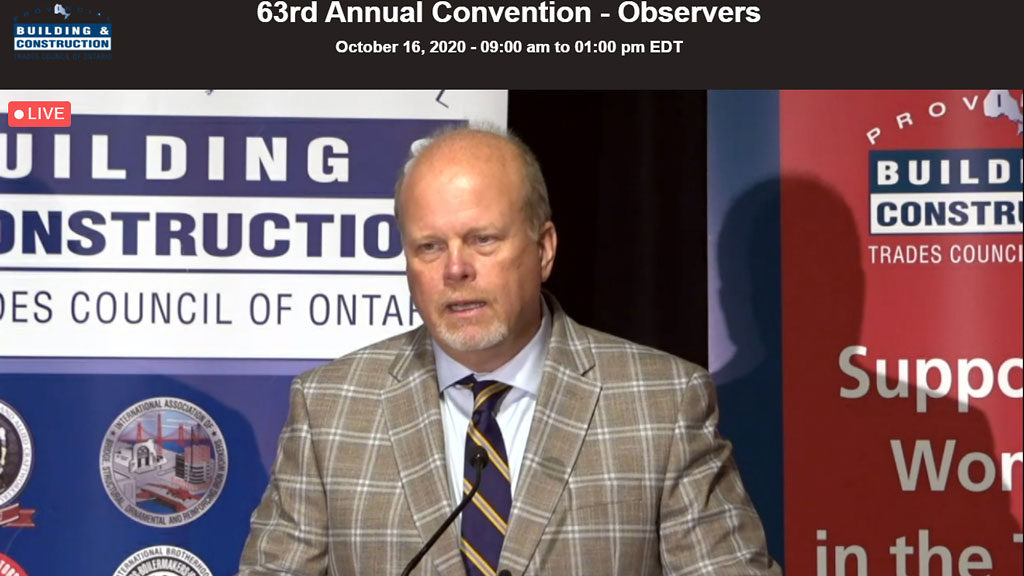Canada’s Building Trades Unions (CBTU) new executive director Sean Strickland has cited new and worrying employment statistics in the construction sector in calling on the federal government to boost infrastructure spending beyond its announced pandemic recovery packages.
Strickland, speaking in person to board members of the Provincial Building and Construction Trades of Ontario assembled in Toronto Oct. 16 for their 2020 Convention and to an online audience, noted a recent report indicated employment in the Canadian construction industry is currently eight per cent lower than what it was in March, pre pandemic.
Beyond that, Strickland said, CBTU contractor partners across the country are saying private sector spending is trending downward as confidence in the market waivers with the ongoing pandemic.
“While people are working now, the beginning of 2021 is uncertain and the third and fourth quarter of 2021 are even less so, with considerably less projects expected on the books,” Strickland said. “We need government to step up and invest in infrastructure now to keep our economy strong.”
Strickland was announced as the CBTU executive director in June.
He told the Ontario Building Trades audience that spending on shovel-ready projects not only would to get Canadians back to work, it would also create opportunities for apprentices.
Pressing the government for more stimulus is one of five CBTU priorities right now, Strickland said. The other four are:
- ensuring Community Benefit Agreements/workforce development agreements are used on all federally funded infrastructure projects to create a pathway to the trades for underrepresented groups;
- providing more supports for apprentices including increase funding for the Union Training and Innovation Program;
- fighting for a workforce mobility tax credit; and
- improving health and safety.
The federal government was slow to sign agreements with the provinces and release the first phase of funding from the Investing in Canada Infrastructure Program, to fund “real, shovel-ready projects,” Strickland said.
And where agreements with provinces have been signed, it is up to the federal government to “flow the money and flow it now.”
In August the federal government announced a $3.3-billion COVID-19 Resilience funding stream that accelerates spending under the Investing in Canada program on a range of pandemic-resilient infrastructure projects. On Oct. 1, the federal government unveiled a $10-billion Growth Plan targeting largely green projects that would be rolled out by the Canada Infrastructure Bank.
Trades workers across the country are suffering because of the COVID-19 crisis, Strickland said.
The Canadian offshore oil and gas industry had already been hit hard by plummeting oil prices, low demand and a glut in supply, and the pandemic caused project delays, cancellations and recently the shuttering of a refinery off the Atlantic coast and the full stoppage of the Husky White Rose project.
In Alberta, he said, COVID has “piled on the hurt that our brothers and sisters are experiencing there.”
The COVID-19 crisis has disproportionately affected women, younger workers and racialized Canadians across all sectors of the economy, Strickland said.
Recent incidents of racism in the GTA are “heinous and completely unacceptable,” he commented.
“But we need to do more than issue a statement, we need to do more than become indignant and upset. As construction leaders we must act and we must lead by example.”
Follow the author on Twitter @DonWall_DCN.











Recent Comments